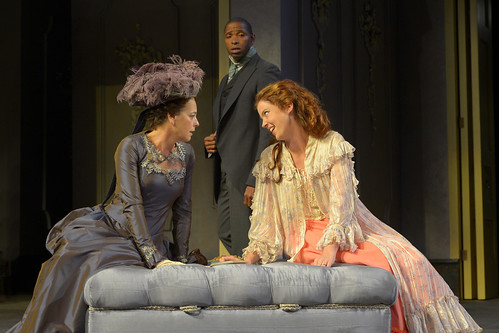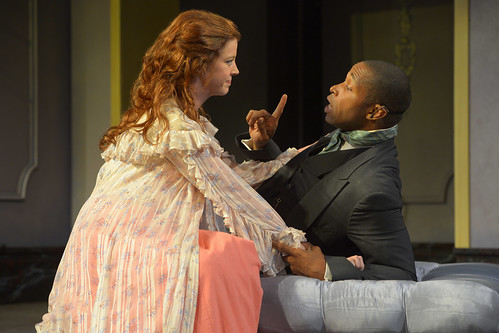Looking at the stars: Cal Shakes fans flames of Wilde's Winderemere
 The central trio of Oscar Wilde's Lady Windermere's Fan includes (from left) Mrs. Erlynne (Stacy Ross), Lord Windermere (Aldo Billingslea) and Lady Windermere (Emily Kitchens). The California Shakespeare Theater production is directed by Christopher Liam Moore. Below: Kitchens and Billingslea work through the first big challenge of the Windermeres' two-year marriage. Photos by Kevin Berne
The central trio of Oscar Wilde's Lady Windermere's Fan includes (from left) Mrs. Erlynne (Stacy Ross), Lord Windermere (Aldo Billingslea) and Lady Windermere (Emily Kitchens). The California Shakespeare Theater production is directed by Christopher Liam Moore. Below: Kitchens and Billingslea work through the first big challenge of the Windermeres' two-year marriage. Photos by Kevin Berne
If you want, as Oscar Wilde did, to make cogent and funny points about men and women, husbands and wives and the notion of good people vs. bad people, what better way to do that than by putting Danny Scheie in a dress and letting him unleash his inner Dame Maggie Smith?
Scheie's performance as the Duchess of Berwick in the California Shakespeare Theater's production Lady Windermere's Fan, Wilde's first major theatrical it, is one of many pleasures in director Christopher Liam Moore's beguiling production. The play itself remains fascinating and relevant, but oh the visual delights of a period piece!
Set designer Annie Smart has fashioned a spacious London townhouse complete with crystal chandeliers on a terrace with draperies blowing in the cool breezes of Saturday's beautiful opening-night performance. York Kennedy's lights add elegance and shadows when appropriate to suit the melodrama. And costumer Meg Neville brings a sly sense of humor to the Victorian costumes, especially for leading lady Emily Kitchens as the young, self-righteous Lady Windermere. Neville makes her look like various slices of cake, with floppy bows and layers of plush stuffing. She's a little like a little girl playing dress-up, which seems only appropriate given that the play takes her from naive, entitled girl to more worldly woman of experience. For the scandal-plagued Mrs. Erlynne (Stacy Ross), Neville cleverly puts in her in a gorgeous black-and-white gown to underscore the extreme ways the character is perceived -- no gray area where she's concerned.
And then there's Scheie, doing a captivating riff on Wilde's Lady Bracknell as the society matron who pronounces all women good and all men bad. Scheie conquers that tricky territory of high comedy and more serious intent that Wilde explores in Windermere. He lets the audience in on the joke, allows the laughs to come in regular waves but never relinquishes the satirical barbs and their sharp, wounding points.
At this point in the 21st century, Wilde's late 19th-century play seems so clearly to be about the folly of conservatism, which is really nothing more than closed-mindedness (willful or naturally occurring) or utter denial of human beings' capacity for complexity and inability to fit neatly into boxes like "good" or "bad." It makes for delicious theater as Wilde sets up Lady Windermere to believe her husband (the stalwart Aldo Billingslea) is having an affair with the much-gossiped-about Mrs. Erlynne. The whole of London society is buzzing about the seemingly flagrant affair Winderemere and Erlynne are conducting, but appearances are rarely what they seem.
The one complication in Wilde's formula is that the Lord and his supposed mistress are completely oblivious that their interactions might be construed as adulterous by gossip-minded outside observers. That doesn't seem quite plausible for two such intelligent characters, but then again, if they'd taken pains to conceal their interactions, we wouldn't have much of a melodrama, and the melodrama here is such juicy fun.
But again, the fun is constantly tempered by something real. One Wildean character can toss off an aphorism like, "Life is far too important a thing ever to talk seriously about." But later comes an observation like, "There are moments when one has to choose between living one's own life, fully, entirely, completely -- or dragging out some false, shallow, degrading existence that the world in its hypocrisy demands." And sometimes the wit and the sting come packaged neatly together: "Gossip is charming! History is merely gossip. But scandal is gossip made tedious by morality."
There are many levels on which to enjoy Moore's sturdy production, and the performances allow insight into all of them. Kitchens is a slightly annoying Lady Windermere, a young mother so impressed by her righteousness that she all but collapses when she's exposed to the real world outside the walls of her comfy cozy ideals. But Ross is a revelation as Mrs. Erlynne, a hardened, bitter woman who discovers she has a heart after all (and she doesn't like it: "Somehow it doesn't go with modern dress. It makes one look old," she says).
Lady Windermere's Fan has a lot to say to a country divided by politics, religion and combinations thereof. "Do you know that I am afraid that good people do a great deal of harm in this world? Certainly the greatest harm they do is that they make badness of such extraordinary importance."
How nice it is to see badness of such goodness on the Cal Shakes stage.
[bonus interview]I talked to director Christopher Liam Moore for a feature in the San Francisco Chronicle. Read the story here.
FOR MORE INFORMATIONOscar Wilde's Lady Windermere's Fan continues through Sept. 8 at California Shakespeare Theater's Bruns Amphitheater, 100 California Shakespeare Theater Way, Orinda. Tickets are $20-$72 (subject to change). Call 510-548-9666 or visit www.calshakes.org. Cal Shakes runs a free shuttle to and from the Oridna BART station and the theater.
